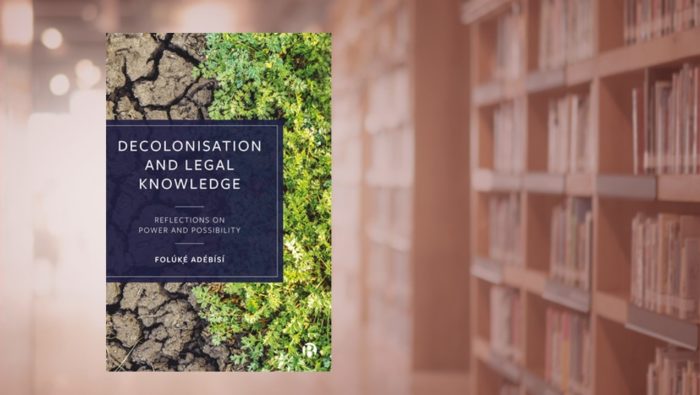
How to Decolonise Legal Knowledge for All?

“The master’s tools will never dismantle the master’s house. They may allow us temporarily to beat him at his own game, but they will never enable us to bring about genuine change.” – Audre Lorde (1984)
On this problem of ‘the master’s tools’, i.e., Eurocentric concepts and praxes, a different stance is advanced by Lewis Gordon and Jane Anna Gordon, who argue that “the proper response” to decimate the imperial hegemony of the master’s house and mastery itself “is …transcending rather than dismantling Western ideas through building our own houses of thought.” Decolonisation and Legal Knowledge: Reflections on Power and Possibility by Folúkẹ́ Adébísí is one such house of thought, which questions the fundamental concepts of law and legal knowledge – their origin, trajectory, meanings, and goals – and their “liberatory potential for ending ongoing colonial logics as well as other global harms and injustices” (p. v).
The book (that is not about decolonising the curriculum, nor an argument for decolonisation) is a joy to read and a difficult pursuit to review. It engages with several texts on decolonisation, Critical Legal Studies (CLS), and beyond, by a wide range of scholars, thinkers, and political activists, including bell hooks, Walter Rodney, Kwame Nkrumah, and Frantz Fanon – along with 15 judicial decisions from the late 17th to the 20th century. Adébísí has weaved her ideas and words in this book like poetry, to invite us to think of how decolonisation can engage with the power and possibility produced by the Euro-modern law through its oppressive force in the social world continually generated by global capitalism (see Koram’s new book), colonialism, and slavery. She suggests that we look for the answer to ‘why decolonise?’ in our global structures which persistently reproduce racial injustice, extreme inequality and poverty, and environmental devastation.
Professor Adébísí valiantly shows the mirror both to academia in the Global North, which ignores its conniving role in ongoing colonialism, and to the Global South, where the colonised-bourgeoisie, while celebrating what Fanon calls “pseudo” or “flag” independence, has co-opted, distorted, and weaponised decolonisation through the colonial practices of oppressive hierarchies, power, and control over the colonised-proletariat-subaltern. However, this approach seems limited to the West’s colonisation. It excludes Global South societies with precolonial oppressive hierarchies, like those produced by the caste system and untouchability in South Asia, which B.R. Ambedkar called “a kind of colonialism of the Hindus designed to exploit the Untouchables”, and how one can imagine decolonisation for such non-West colonisation.
The Introduction chapter begins with an evocative account of the (Euro-modern) law, which Adébísí describes as “a version of law…distinguished from pre-existing and still existing indigenous jurisprudence systems” (p. 2) – the laws of the colonisers. She critiques how far the ontological, epistemological, and pedagogical aspects of its orthodoxy are exposed, and argues that in the Global North, “‘decolonising the curriculum/law school’ has become a term of art”, which, “often does not involve decolonisation at all” (p. 10). This Chapter contends that the Euro-modern law’s pretensions to objectivity, neutrality, and universality and its relation to power, along with the legal knowledge they co-create, manifest comfortably in law schools resulting in the erasure and/or demotion of indigenous jurisprudences.
Moving forward, Chapters 1 through 5 unsettle specific problematic premises upon which the discipline of (Euro-modern) law has been advanced and sustained. In Chapter 1, Adébísí brilliantly maps several contextualised theories of decolonisation by setting the tone with a brief history of ‘colonial discovery’ of Americas, Africa, Asia, and Oceania. She offers an analogy of the ‘colonial table’, to help the reader understand the diversity, fragmentation, and limitation of critiques of, and demands within decolonising movements. In Chapter 2, the Euro-modern legal knowledge’s complicity has been explored not only in the form of legitimisation of imperialism but also as the instrument of legitimising dispossession and racialisation. The next three chapters (3-5) indulge in defining what Adébísí calls ‘the Law’s Subject’ through the three foundational legal concepts – the body, space, and time. The final chapter (6) brings us back to ‘The Law School’, to reflect on the role of teachers, students, and researchers, to understand knowledge cultivation as a communal process by making present all voices and histories, and valuing the relationship between law, emotion, and society in the classroom and research field. The conclusion rightly reminds us that to pull down the structure built by the capitalist-colonial-enslavement project, an ethical employment of decolonisation of legal knowledge and pedagogy is inevitable.
The book, I believe, is about hope for producing flourishing, newer meaningful anticolonial worlds for all, beyond law schools and universities, and yields suggestions for their materialisation through decoloniality from within the neoliberal-ised law school. Decolonisation, thus, is neither to merely diversify the face of coercive power nor to become a new master. This book, which requires revisits, should be prescribed as an essential text for (legal and non-legal) students, teachers, and activists alike, to learn that to decolonise our legal knowledge and teaching/research, means acknowledgement and complete cessation of the colonial logics and praxes produced by and simultaneously producing the (Euro-modern) law, and to repair the colonial past.

